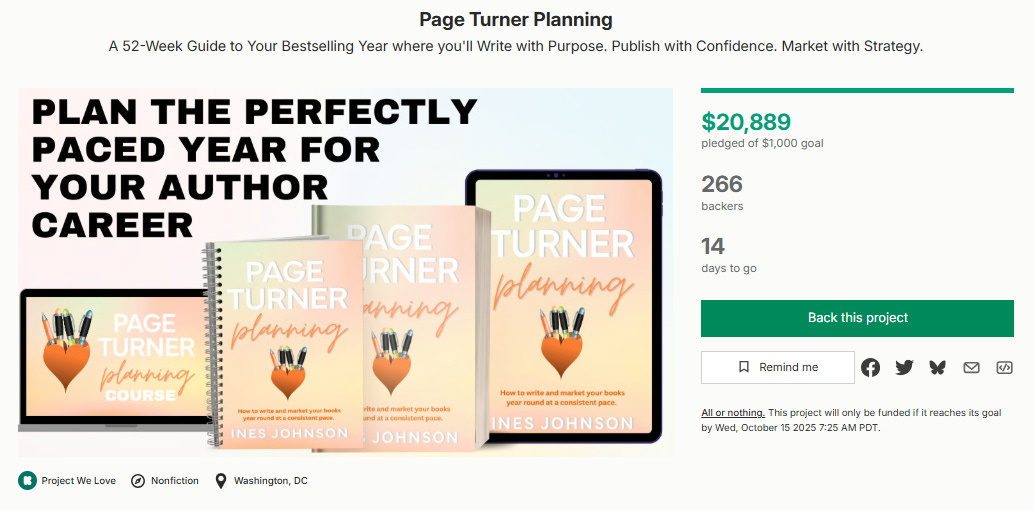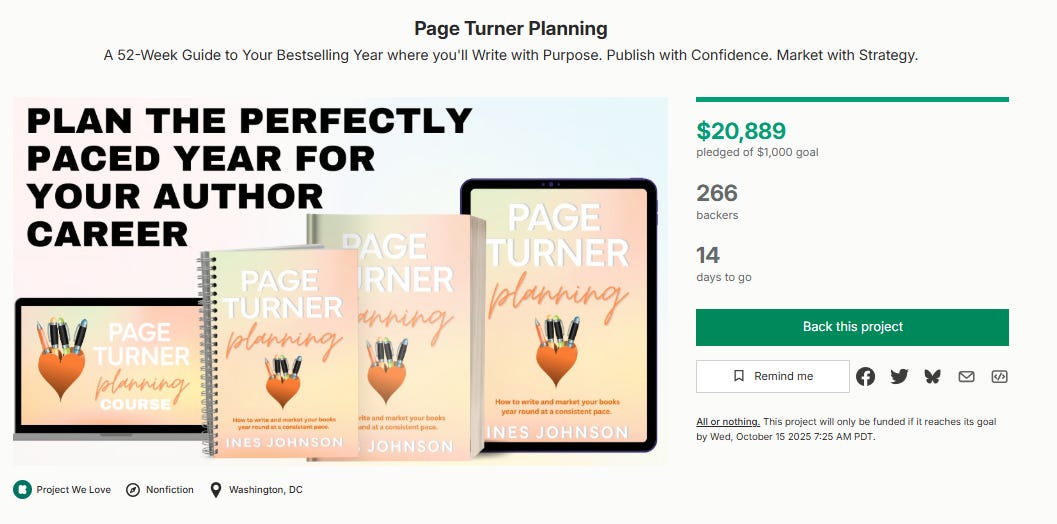Setting SMART Goals for Success
Do you have a goal, or do you have a burden? Learn how to make goals that will energize you instead of feeling like a weight dragging you down.
Hi,
The start of a new year always feels like a fresh notebook. Blank pages. New chapters waiting to be written. But for authors, it’s not just about resolutions. We write those at the end of every book. For us, it’s about building a career, a body of work, and a life that supports our creativity.
None of that happens by accident. It happens when you set goals.
Now, I know the word goals can feel overwhelming. Maybe you’ve tried to set them before and ended up frustrated. Maybe you’ve been told to “just write more books” without any real plan behind it. But today, I want to reframe goals for you. Think of them not as rigid rules but as guiding lights. Something that helps you know where you’re headed and how to get there.
But before I tell you where to go, maybe I should tell you who I am.
Hi, I’m Ines Johnson, I write kissing books and I teach marketing and craft strategies to authors. I’m a friend of Russell’s. He’s the reason my very first Kickstarter was such a success — it earned over $50K.
How did that happen? He pushed me to focus on my goals. Not vague dreams, but real, clear goals. Then together we made a plan to reach them.
That lesson changed everything for me. It’s the same thing I want to offer you with Page Turner Planning, a 52-week system to help you set smart goals, stay consistent, and move forward in your author career without burning out.
Because at the end of the day, success isn’t about luck. It’s about knowing where you’re going, why you want to get there, and how to take the next step.
And that starts with goals. Particularly, SMART goals.
SMART Goals
A goal shouldn’t be something you just hope will happen. It should be structured and actionable — a plan that turns your writing dreams into tangible outcomes.
SMART stands for:
Specific - Can you point to it? If your goal isn’t clear enough that you can point directly at what success looks like, it’s not specific.
Measurable - Can you point to it? If you can’t count, track, or log your progress somehow, it’s not measurable.
Attainable - Can you reach it? If your goal is so far out of reach that it feels impossible, your brain will shut down. You have to believe you can grab it.
Relevant - Can you connect it? If your goal doesn’t tie into your bigger picture of your vision, it’s not relevant.
Time-bound - Can you set a timer to it? If there’s no deadline, it’s just a wish. You need to know when you’re supposed to start and finish.
Instead of saying, “I want to grow my readership,” a SMART goal would look like: “I will grow my newsletter (attainable) by 500 subscribers (measurable) by June 30th (time-bound) by running a BookFunnel giveaway (specific) and promoting my signup link in the back of my new release (relevant).”
See the difference? One is a dream. The other is a roadmap.
The Three Types of Goals
Over the years, I’ve found that most author goals fall into three categories. If you want a balanced career, it helps to have all three.
Income Goals: These are your financial targets. How much do you want (or need) to make? This isn’t just about “more money” — it’s about knowing your numbers so you can plan your writing and marketing accordingly.
Performance Goals: These are measurable career milestones that aren’t directly tied to money. Things like growing your newsletter list, hitting a preorder target, or landing podcast interviews.
Emotional Goals: These are the most overlooked. How do you want to feel as you build your career? Secure? Energized? Balanced? It doesn’t matter if you’re hitting numbers if you’re burned out and miserable. Emotional goals keep your career sustainable.
Say your income goal is $13,000 a month in order to take care of your family and yourself. Instead of leaving that as a big scary number, break it into money jobs:
$3,000 Household Expenses
$5,000 Business Expenses (editing, covers, ads)
$2,000 Debt Repayment (hello, graduate degree + daughter’s undergrad)
$2,000 Savings/Retirement
$1,000 Self-Care & Entertainment
Suddenly, that $13,000 isn’t an abstract number. It’s a living budget that tells you what your books need to earn and why.
Backlist vs. Frontlist
One of the most useful exercises I do every year is to analyze my backlist and frontlist.
Backlist Titles: These are your previously published books. Look at how much income they generated last year. Even small improvements matter. My personal goal is always to beat last year’s numbers, even if it’s just by $1.
Frontlist Titles: These are your new releases. Knowing how a book performs in its first year can help you plan smarter for future launches. (And for the record, if a new release makes more than $3,000 in its first year, I count that as a win.)
Remember: every frontlist book eventually becomes part of your backlist. Your catalog is cumulative.
Setting Your Goals
So, with all this in mind, how do you set your goals for the year?
Define your income target. Know your number and break it into money jobs.
Choose 1–3 performance goals. Pick something measurable like newsletter growth, preorder numbers, or social engagement.
Set at least one emotional goal. Maybe it’s about balance, confidence, or protecting your writing joy.
Check your backlist and frontlist. Use real numbers to inform your plan.
The key here is kindness. Don’t set goals to punish yourself. Set goals that challenge you just enough to grow without pushing you into burnout.
Action Steps
Here’s your assignment this week:
Write down one income goal, one performance goal, and one emotional goal for your author career for the remainder of 2025.
Break your income goal into money jobs. (Even if it’s just “ads,” “savings,” and “coffee fund.”)
Look at your backlist and frontlist numbers. Where did you win last year? Where do you want to improve?
Turn one of your goals into a SMART goal. Make it specific, measurable, attainable, relevant, and time-bound.
Remember, your writing career is a marathon, not a sprint. Goals aren’t cages — they’re scaffolding. They give you the structure to grow in the direction you want.
I believe in you. And I can’t wait to see where your goals take you this year.
If you’ve ever wished someone would just tell you what to focus on each week so you could stop spinning your wheels, then check out my Page Turner Planning Kickstarter. It’s a 52-week system for authors that’s a planner, book, course, and mastermind invite — and it funded in just 20 minutes! That’s because I’m still following Russell’s plan!
What do you think?
Are your goals “SMART”, or are you flailing wildly?
Can you turn your goals into SMART goals?
What is your SMART goal. Let us know in the comments.
If you enjoyed this one, I highly recommend checking our archive, with over 600 exclusive member-only posts about how to help you build your own author career, including our course, fund your book on Kickstarter. You can take it for free with a seven-day trial, or give us a tip if you want to support us without committing long term.








Two of my fave writers get together! @Russell Nohelty @Ines Johnson
Honestly, I think sometimes the focus is more on the acronym than the actual intent and the goals themselves. I also think that if goals aren't cascading, they'll never be smart enough.